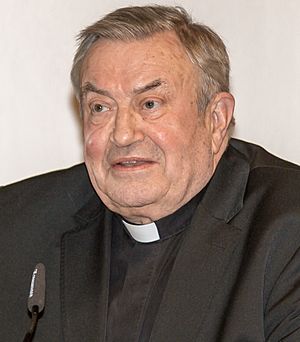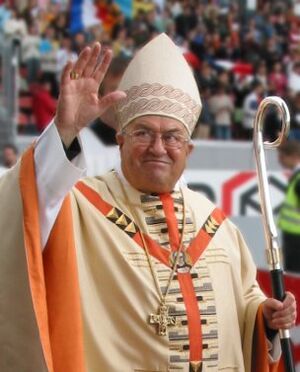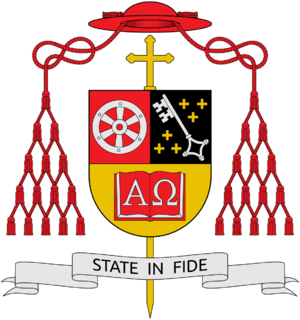Karl Lehmann facts for kids
Quick facts for kids His Eminence Karl Lehmann |
|
|---|---|
| Cardinal, Bishop of Mainz | |

Cardinal Lehmann, 2014
|
|
| Church | Mainz Cathedral |
| Province | Freiburg im Breisgau |
| Diocese | Mainz |
| Appointed | 21 June 1983 |
| Enthroned | 2 October 1983 |
| Reign ended | 16 May 2016 |
| Predecessor | Hermann Volk |
| Successor | Peter Kohlgraf |
| Other posts | Cardinal-Priest of S. Leone I |
| Orders | |
| Ordination | 10 October 1963 |
| Consecration | 2 October 1983 by Hermann Volk |
| Created Cardinal | 21 February 2001 |
| Rank | Cardinal priest |
| Personal details | |
| Born | 16 May 1936 Sigmaringen, Germany |
| Died | 11 March 2018 (aged 81) Mainz, Germany |
| Nationality | German |
| Denomination | Roman Catholic |
| Motto | State in fide (English: "Stand firmly in the faith") – 1 Corinthians 16:13 |
| Coat of arms |  |
Karl Lehmann (born May 16, 1936 – died March 11, 2018) was an important German Cardinal in the Catholic Church. He served as the Bishop of Mainz from 1983 to 2016. In 2001, he became a Cardinal. He was also the leader of the Conference of the German Bishops from 1987 to 2008. During these years, he was seen as one of the most important religious leaders in Germany. He was known for supporting more modern ideas within the Church. Before becoming a bishop, he taught theology at the University of Mainz and the University of Freiburg.
Contents
Early Life and Education
Karl Lehmann was born in Sigmaringen, Germany. He grew up in a town called Veringenstadt. His father was a teacher, and his mother was trained as a bookseller. During his high school years, he lived in a Catholic student home in Sigmaringen.
He studied at the Seminary of Freiburg from 1957 to 1964. After that, he went to the Pontifical Gregorian University in Rome. There, he earned a doctorate degree in philosophy in 1962. He also received a doctorate degree in theology in 1967.
He became a priest on October 10, 1963, in Rome. During the Second Vatican Council (1962–1965), he worked as an assistant to a famous theologian named Karl Rahner. He also assisted Rahner at the University of Munich from 1964 to 1967.
In 1968, he became a professor of dogmatic theology at the University of Mainz. He held this job until 1971. Then, he became a professor of dogmatic and ecumenical theology at the University of Freiburg. From 1974 to 1984, he was also a member of the International Theological Commission.
Becoming a Bishop and Cardinal
In 1983, Karl Lehmann was chosen to be the Bishop of Mainz. He was 47 years old, making him the youngest Catholic bishop in Germany at that time.
In 1985, he became the deputy leader of the Episcopal Conference of Germany. Two years later, in 1987, he was elected as the chairman (leader) of the conference. He held this important position for 21 years, until 2008. This made him one of the most influential people in German Catholicism during that period.
He was also a member of the Congregation for the Doctrine of the Faith from 1986 to 1998. From 1993 to 2001, he served as the vice-president of the Council of the Bishops' Conferences of Europe.
In 1993, Bishop Lehmann and two other bishops wrote a letter. This letter suggested that the Church should be more flexible. It talked about allowing divorced people who had remarried to receive the Eucharist. This letter was read in churches in their dioceses in September of that year.
Bishop Lehmann often said that the 1998 Katholikentag (a large Catholic gathering) in Mainz was one of the best moments during his time as bishop.
Pope John Paul II made Lehmann a Cardinal on February 21, 2001. Many people were surprised by this, as Lehmann was known for his more modern views. Former German Chancellor Helmut Kohl, who was a friend of Lehmann, had asked the Vatican for this appointment.
Cardinal Lehmann took part in the elections for new Popes. He was one of the cardinals who voted in the papal conclaves of 2005 and 2013. These elections chose Pope Benedict XVI and Pope Francis. His special church in Rome was called San Leone I.
Pope Francis accepted Cardinal Lehmann's resignation as Bishop of Mainz on May 16, 2016. This was on his 80th birthday.
Many people saw him as a leader who wanted to build bridges between different views. They called him a "man of dialogue" and a "stroke of luck for German Catholics." Some people who held more traditional views sometimes disagreed with his ideas.
Coat of Arms
Cardinal Lehmann's coat of arms had special symbols. It included a wheel from the Diocese of Mainz. It also had a key from the Diocese of Worms. There was an open book with the letters Alpha and Omega. This symbolized the message of Jesus Christ and showed the Cardinal's love for books.
His Latin motto was State in fide. This means "Stand firmly in the faith" in English. It came from a Bible verse in 1 Corinthians 16:13.
Later Years
Cardinal Lehmann's last public appearance was in August 2017. He attended the special ceremony where Peter Kohlgraf became the new bishop of Mainz.
In September 2017, Lehmann had a stroke and a brain hemorrhage. This meant he needed a lot of care, first in the hospital and then at home. He passed away on March 11, 2018.
German Chancellor Angela Merkel shared her sadness about his death. She said he was one of the most important figures in the Catholic Church in Germany. The leader of the German Bishops' Conference, Reinhard Marx, also honored Lehmann. He said Lehmann had a big impact on the Catholic Church around the world.
Awards and Honors
Cardinal Lehmann received many awards for his work:
- 2000 Order of Merit of the Federal Republic of Germany
- 2002 Order of Merit of Baden-Württemberg
- 2006 Commander of the Legion of Honour (from France)
- 2009 Hessian Cultural Prize
- 2009 Order of Merit of Rhineland-Palatinate
- 2016 Martin-Luther-Medaille, given by the Evangelical Church in Germany
See also
 In Spanish: Karl Lehmann para niños
In Spanish: Karl Lehmann para niños
 | Jessica Watkins |
 | Robert Henry Lawrence Jr. |
 | Mae Jemison |
 | Sian Proctor |
 | Guion Bluford |



